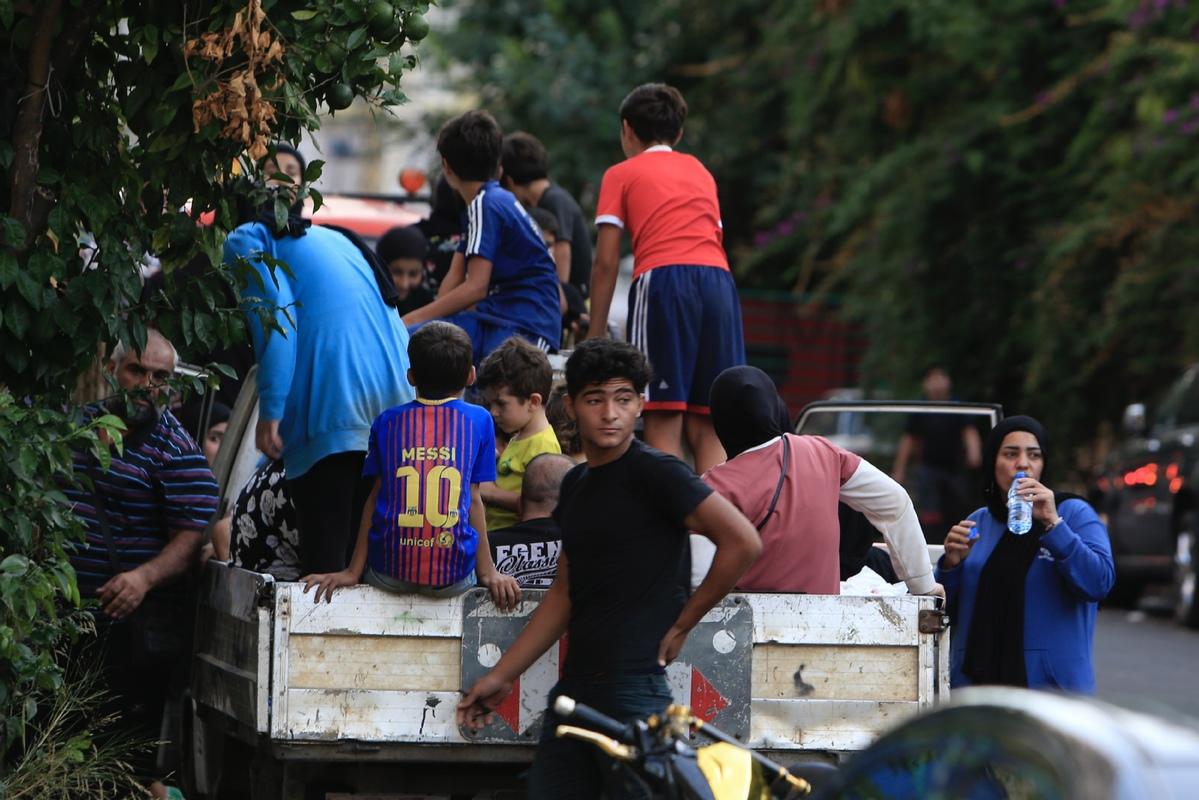
Photo taken on Sept 23 shows some Lebanese residents fled their homes by car and moved to safety. The death toll from the largest Israeli airstrikes in Lebanon since the onset of the Israel-Palestine conflict has risen to 492, the Lebanese Health Ministry said on Monday night. [Photo/Xinhua]
This is an editorial from China Daily.
At least 492 people, including 35 children and 58 women, have reportedly been killed, and more than 1,600 wounded in Israel's air strikes on alleged Hezbollah targets in Lebanon on Monday. That made it the deadliest day in the Israel-Hezbollah conflict since 2006.
Some claim that the air strikes, along with those on alleged Hezbollah members via pagers and walkie-talkies that reportedly killed dozens and wounded thousands, have pushed the militant group into the biggest crisis it has faced in four decades.
But more likely than not this is merely another escalation in the seemingly endless death loop of the Israel-Hezbollah conflict. As the violent exchange is closely tied to the Israeli military offensive against Hamas in the Gaza Strip, the current exchanges of fire may not end until peace is restored in the Palestinian enclave.
Both Israel and the Hezbollah said this only marks the start of a new stage in their conflict. Israel is determined to push its offensive into the Bekaa Valley in northeast Lebanon, which is believed to be a Hezbollah stronghold. While Hezbollah leaders have openly said they will not stop until there is a cease-fire in Gaza. Considering both sides' apparent obsession with the bloodspilling logic of strike and counterstrike, however, neither should expect accomplishing its goal without paying a hefty price.
Israel's purpose may seem easily achievable — to diminish Hezbollah's ability to fire rockets and missiles across the Lebanon-Israel border, to push Hezbollah fighters back from the frontier, and to destroy the military infrastructure used by Hezbollah to attack Israeli communities. But even if it realizes these objectives, it will hardly suffice to create lasting peace for its vast border regions. Unlike Hamas, Hezbollah can find cover across Lebanon. Not to mention the militant organization is far bigger and better equipped than its Hamas sibling. Let alone its close connection and coordination with Israel's other foes in the region, including Iran and its proxies. Since the Oct 7 Hamas attacks on Israel, both Iran and Houthi forces in Yemen have launched sporadic strikes on Israeli targets. Hezbollah has claimed it is attacking in response to Israel's military operations in Gaza. In spite of Israel's belief that it is quite close to the set goal of eliminating Hamas, the truth is there will be no complete success — since Hamas elements are scattered across the area. So are the other anti-Israel forces.
Like the conflict in Gaza, Israel's objectives in its offensive against Hezbollah won't be quickly achieved. And that may prove damaging to the Israelis, too. Israel's campaign against Hamas began with considerable international sympathy, but it soon became a target of international condemnation thanks to the growing humanitarian crisis its military action has precipitated in Gaza. The same will be true of its ongoing strikes on Hezbollah.
As Prime Minister Benjamin Netanyahu and other Israeli officials conceded, they were bombing civilian infrastructure used by the militia to hide rockets, missiles, launchers and drones. They are not sure about the "secondary" damage to civilian lives. Considering the way militia forces in the region blend themselves into local communities, the way the current Israeli offensive is executed no doubt carries huge humanitarian risks. Hundreds of thousands of Israeli and Lebanese civilians have been displaced in the present round of violence. As the conflict drags on, countless more will be.
In a meeting with his Lebanese counterpart in New York on Monday, Chinese Foreign Minister Wang Yi reiterated Beijing's resolute opposition to "indiscriminate attacks targeted at civilians", citing the pager attacks, and he strongly condemned Israel's Monday air strikes, which he said "violated the basic principles of international relations".
"Countering violence with violence will not solve the problems in the Middle East and will only lead to an even greater humanitarian disaster." He again called for implementing the "two-state solution" for Palestine as a precondition for lasting peace in the region.
In other words, the mutual hostility between Israel and its regional foes has to be addressed as an organic whole.

 中文
中文



